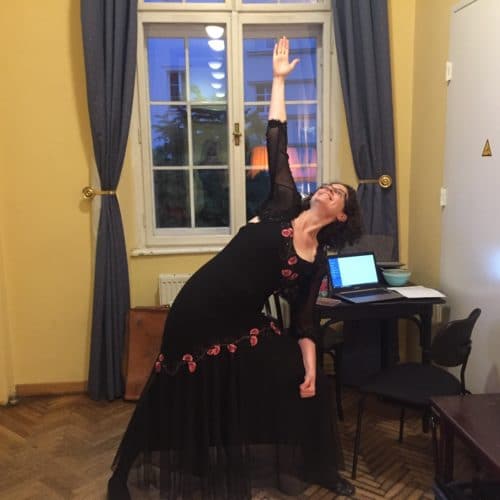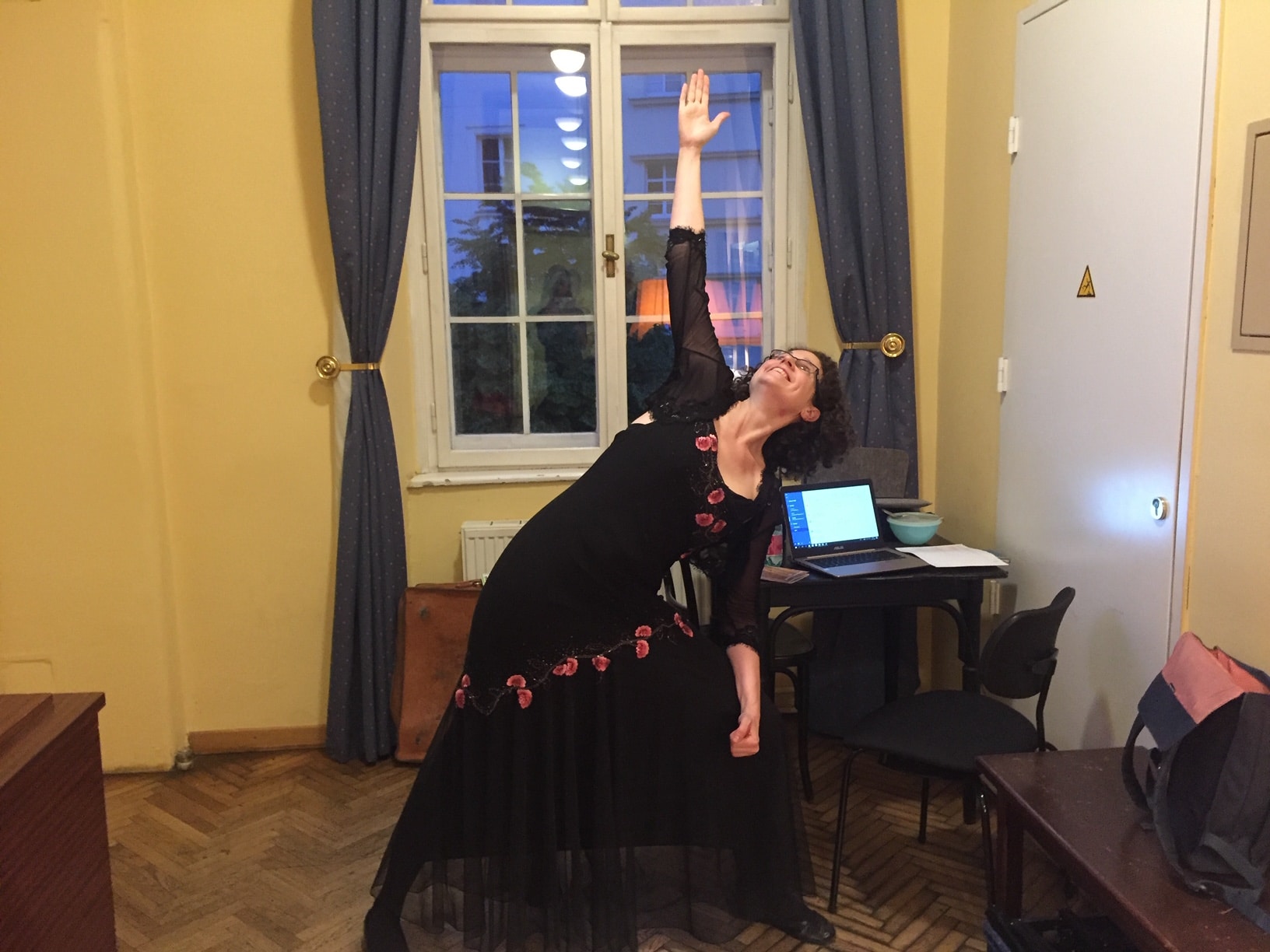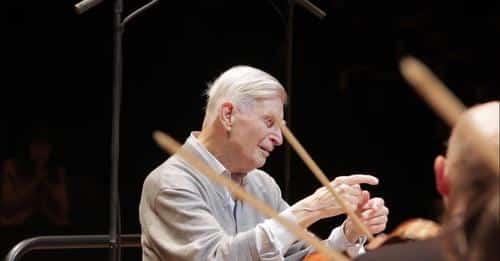How to be a podcaster
mainOur diarist Anthea Kreston is back – and with a new string to her bow:
It’s been a busy couple of weeks – my last concert with the Artemis Quartet in Paris was also the first day that I began my new work on podcasting. It’s a lot of fun to do – learning new equipment, researching for interviews, editing and designing the flow of a program. Here I will give a “how to” list of starting your own podcast – from the simplest way to more high-end. And also I will include a list of some of my favorite classical music podcasts to listen to. Enjoy!
Equipment:
This can be, like anything I suppose, a never-ending quest for the next best piece of hardware, the fanciest doo-dad or accoutrement. At one point I was so tangled in my own cords while walking around interviewing people that I ordered a fishing vest and cargo pants online so I could have enough pockets for all my various tidbits. I looked pretty professional, I bet.
You have to decide what kind of podcast you want to do. Face-to-face interviews? Inside or outside? Remote interviews? No interviews – just you?
Here is a list of hardware and software – you can do a podcast for free on your phone and GarageBand or Audacity. Or you can get a professional set-up for around €750. Or you can start small and add as you go.
Recording:
Level 1 – your phone with internal mic
Level 2 – your phone with an external microphone plugged into the bottom (I use a Shure MV88 digital stereo mic – it’s about the size of an apricot and plugs into the bottom of my iPhone, using phantom power from the phone – no batteries, €144). A phone can be nice because you also have the option of a Vlog – Video Blog.
Level 3 – Zoom recorder – I have the H4n Pro (€195). This handy little recorder is amazing – two attached mics can be used at either 90 degrees or 120 degrees, and by putting a fuzzy windscreen on it, you can record outside
Level 4 – audio interface – this is something that attached to your computer to create professional-level audio – it is small enough that you can bring it with you, but it is the foundation of a good home-studio. I use a Focusrite Scarlett 2i2 (€122) which can be used for a single mic or double.
Mics:
Levels 1-2 – See above
Level 3: professional shotgun mic – I use a Rode NTG-4 directional mic (€229). This is a professional-quality mic which is also very versatile. It can be plugged into your Scarlett/computer for your solo voice (or get a second for studio interviews), and also on-location – plug it into one of the 2 inputs on the Zoom H4N Pro for interviews anywhere you want (put a fuzzy windscreen on if you are outside). You zoom can record 4 channels at once – when outside, you can have the Rode for your subject, a clip-on mic for yourself (plugged into the second input) and use the internal Zoom mics set at 120 degrees to catch birds, traffic, audience “peas and carrots”…..at home, get a mic stand (clip or portable for on-location interviews, €10-20), and a pop-filter (removes the hard “s” and “t” sounds (€15)
Level 4:
A pair of clip-on lapel mics. I use Comica CVM V020 XLR Omni-directional (€80 for a pair). They also come with adorable little windscreens (think Tribbles from Star Trek) so you can use them outside. If you have 2 people you are interviewing, you can have each wear one (plugged into the Zoom) and you can use the internal Zoom microphones set at 90 degrees for yourself.
Level 5:
Get yourself a nice pair of headphones. You need these for the Scarlett, for on-location recording, and maybe editing (lots of options – between €75-130).
Of course you can always add on – I have rechargeable batteries, external power supply for the Zoom, high-quality cables, extra SD cards…..
Software:
Level 1: GarageBand or Audacity – these are both free – I use a combination of both for different reasons. You can also upgrade to fancier systems.
Planning and implementing:
The most important thing is to start organized, and remain organized. Folders on your computer with detailed sub-folders – for audio files, writing your material, outlining your programs, planning the interviews, having a library of bios and pertinent historical information.
I use Scrivener for planning (€20). It is a program designed for authors to be able to organize materials, make outlines, and it is totally amazing. I have an entire section on how each of my pieces of equipment works, with their attached instruction manual. I wouldn’t be able to make a podcast without this.
I also do a lot of recording via Skype (free). It’s super convenient, and by recording also with my Zoom (Skype also can record internally – I do both), you can get a super sound.
Other stuff:
Have fun, experiment, get used to how terrible your voice sounds! There are a lot of YouTube things for equipment, organizing your podcast, editing. Resonate Recordings has a nice series. There are endless things I could write here, but this should get you started. Feel free to ask questions – I would be happy to help!
Some of my favorite Classical Podcasts:
Sticky Notes, Joshua Weilerstein
Skip the Repeat, Kai Talim
BBC Music Matters, Tom Service
And – if you want to check out what I have been doing for the last 2 weeks look online for the Pierre Boulezsaal, under Quartet Week. Here is the link https://boulezsaal.de/quartet-
Have a great week!







I never listen to podcasts on any subject unless perhaps they proved a detailed written transcript with jump-enabling timelinks so that I know what to skip.
They invariably start off with irrelevant chatter and blather on for far too long, sometimes hours, punctuated by unfunny jokes, by people who love hearing their own voices. Just like lectures.
Possible exception: you need therapy for insomnia, but a soccer match on TV would be better for that.
I guess you only listen to bad podcasts. Sticky Notes, mentioned above, is not one of them. Most episodes are explorations of a single classical work; a few explore a group of pieces with a common theme. I’ve often learned new things about music that I thought I knew well. There is no transcript provided, but everything is to the point. There is no “chatter.”
Outside of the area of classical music, there are many podcasts that tell a story or explore a specific topic. Of course, there are others which are like bad TV talk shows–but if that’s all you’ve found, you haven’t looked too hard.
Harrison – take a listen to these. Have you clicked yet? They come with transcripts in English and German. They are packed with content, serious music, and yes, conversation. Interviews with some of the leading string quartets on the planet, discussions on intonation, concert preparation, Jewish music, working with Pierre Boulez and Daniel Barenboim, commissioning, and the deepest meanings behind late Beethoven….
These podcasts are between 8-20 minutes each. Take a listen and let me know what you think afterwards.
Anthea — I thoroughly enjoyed the contemporary quartet music excerpts played by the Quatuor Diotima, and learned about the Boulez Room for the first time –it took some searching on the website to establish where it is actually located (Berlin), but that motivates me to visit.
I had some difficulty understanding the French players’ English because – like many French people — they speak the English words at TGV speed using French phonetics. Perhaps you could persuade them to speak at half tempo next time.
So: 5 stars for the content and 3 for the delivery, which I hope is encouraging.
Hi Harrison –
I know what you mean! Good to know for the future. I think that the transcriptions help with that, in the mean time? The Jerusalem and Heath and Michelangelo and Arditti and Oistrakh should all work for you. The Oistrakh has a very good ending……
Don’t much care for those new-fangled electric lights neither. And don’t get me started on that horseless carriage monstrosity. The noise! The steam!
I listen to Sticky Notes even though Weilerstein tends to get bogged down in “Musicologist-Speak”. It’s great if you have a musical background but for the general music loving public, going on and on about key changes, leaves me behind and I stop listening.
I have tried to understand music theory over the years (I am now 70), even taking some evening course work, but it just doesn’t stick. Furthermore, I find that classical music can be appreciated without it.
Good luck with your podcast.
Well, this is a new direction for sure but one to which I think you will bring a great deal with your teaching and playing background, and your particular approach to things musical. I listen to a lot of podcasts (at the gym, walking, on the train, in the car) so will add yours to the list.
When will your podcasts become available?
I will keep you posted!
Anthea-
I was not able to subscribe and listen to your podcasts via my preferred app: Overcast.
Subscription apps included with iTunes, Google, Spotify, allow podcast listeners to listen while doing other things; they make podcast listening fluid. You don’t need to be sitting at your computer to download, listen and archive favorite podcast episodes. They also allow seamless integration from multiple sources into an accessible central location.
You probably know all of this, but I thought I would mention it anyway.
Dear Augustine –
The Boulezsaal uses SoundCloud – I was able to listen on my phone. I think they might put the series up on iTunes when it is complete – good to have your feedback on that! Not sure if SoundCloud has a subscription. Let me check on that…thanks!
Just a question: What did the Artemis Quartet think of the appearance of these regular posts?
Dear John –
Not sure – I stepped away from the quartet before I began this series. I think any quartet player would love to hear other quartets talk, though!
I mean podcasts after those done at Boulezsaal?